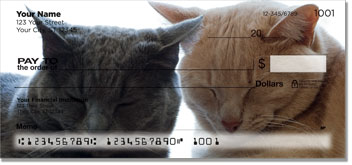Buy personal checks with Cat Nap designs

 Cat Nap Checks – $14.65 A cat nap is the epitome of feline elegance and tranquility, a mesmerizing display of pure contentment that warms the heart. As our furry companions curl up in a sun-soaked spot or a cozy nook, their gentle purrs and soft breaths become the soundtrack of serene moments. Watching their whiskers twitch and tails flicker while they dream is a testament to the simple joys of life. The beauty of a cat nap lies not only in the peaceful rest it provides to our feline friends but also in the calming, soothing effect it has on those who bear witness to this endearing spectacle. |
Cat naps are a common sight in the lives of cat owners, with our feline companions often seen snoozing throughout the day. But why do cats nap so much, and what is the significance behind these short slumbers? In this article, we will delve into the world of cat naps, exploring the reasons behind this behavior and the importance of cat naps for our furry friends’ overall well-being.
Why Do Cats Nap?
Cats are known for their love of napping, and there’s a good reason for it. Their wild ancestors were predators that expended a significant amount of energy hunting for food. As a result, cats evolved to sleep in short bursts to conserve energy between hunting sessions. Even though domesticated cats no longer need to hunt for their food, their natural instincts still drive them to sleep frequently throughout the day.
The Sleep Patterns of Cats
Cats have a unique sleep pattern compared to humans. While humans typically experience deep sleep for an extended period, cats sleep in shorter cycles that consist of both light sleep and deep sleep. During light sleep, cats can quickly awaken and spring into action if needed. This ability to sleep lightly and wake up quickly was crucial for their survival in the wild.
How Much Sleep Do Cats Need?
On average, cats sleep for about 12 to 16 hours per day, with some cats sleeping even more. Kittens and senior cats tend to sleep more than young adult cats, as they require more rest to support their growth and maintain their health. The amount of sleep a cat needs can vary based on factors such as age, health, and activity level.
The Benefits of Cat Naps for Feline Health
Cat naps play a vital role in maintaining a cat’s overall health and well-being. Regular sleep allows cats to conserve energy, support their immune system, and promote healthy growth and development. In addition, sleep is essential for brain function, as it helps cats process information and memories.
How to Support Your Cat’s Napping Habits
Providing a comfortable and quiet environment for your cat to nap in is crucial for their well-being. Ensure your cat has a cozy and safe place to sleep, such as a soft bed, blanket, or even a cardboard box. Additionally, try to maintain a consistent daily routine to help regulate your cat’s sleep patterns and reduce stress.
Cat Naps and Behavioral Changes
Changes in your cat’s napping habits can sometimes indicate an underlying issue. If your cat is suddenly sleeping more or less than usual, it’s essential to consult with a veterinarian to rule out any health problems. Addressing any concerns early on can help ensure your cat remains happy and healthy.
The Importance of Cat Naps in Multi-Cat Households
In multi-cat households, it’s crucial to provide each cat with its own space to nap. This can help reduce stress and territorial disputes among the cats. By offering multiple sleeping areas and ensuring each cat has a designated spot to rest, you can promote harmony within your multi-cat home.
Conclusion
Cat naps are an essential aspect of a cat’s life, allowing them to conserve energy, maintain their health, and stay alert. By understanding the reasons behind cat naps and providing a supportive environment for your feline friend, you can ensure they enjoy a healthy and happy life full of restful slumber.